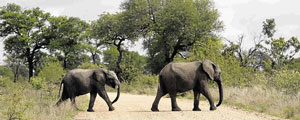
WITH the elephant population ballooning, wildlife authorities have resorted to using 45 generators, each consuming 200 litres of diesel a week from June to November, to ensure the animals can get water.
The strategy appears to be working. So far this year, around 17 elephants have died in the area due to extreme heat and lack of water, compared to 77 last year.
“The elephants drink close to 90% of all the water (pumped) here,” said Edwin Makuwe, an ecologist with the Zimbabwe Parks and Wildlife management Authority (Zimparks).
“I think elephants now know that when they hear an engine running, chances are that there is water close by.”
But the water, while life-preserving, may be running against the flow of nature. The 14 600-square-kilometre reserve is home to between 35 000 to 40 000 elephants, twice its capacity. The increase in the elephant population has led to higher demand for water at the park, home to over 100 different species of animals, including the “Big Five”: elephant, lion, leopard, buffalo and the endangered rhinoceros.
Makuwe said the rise in the elephant population at the game reserve, established in 1949, had also led to the destruction of the environment. “There is so much activity by the elephants that the vegetation has been affected negatively, the trees are no longer growing as fast as they should.
“(The trees) are no longer producing as many seeds as they should. In the long term this will have a negative effect on the entire habitat of Hwange.”
He said the quality of the forage had gone down, with elephants stripping tree barks and digging roots for food. “The African savanna is supposed to be a mosaic of trees and grasses. The moment you start to have more grasslands than trees it is no longer functioning as African savanna.” Makuwe fears small animals and insects that live in the trees risk extinction.
- Chamisa under fire over US$120K donation
- Mavhunga puts DeMbare into Chibuku quarterfinals
- Pension funds bet on Cabora Bassa oilfields
- Councils defy govt fire tender directive
Keep Reading
“If you lose the trees and you are left with the grasslands, then definitely some of the species will be lost,” he said.–Sapa











